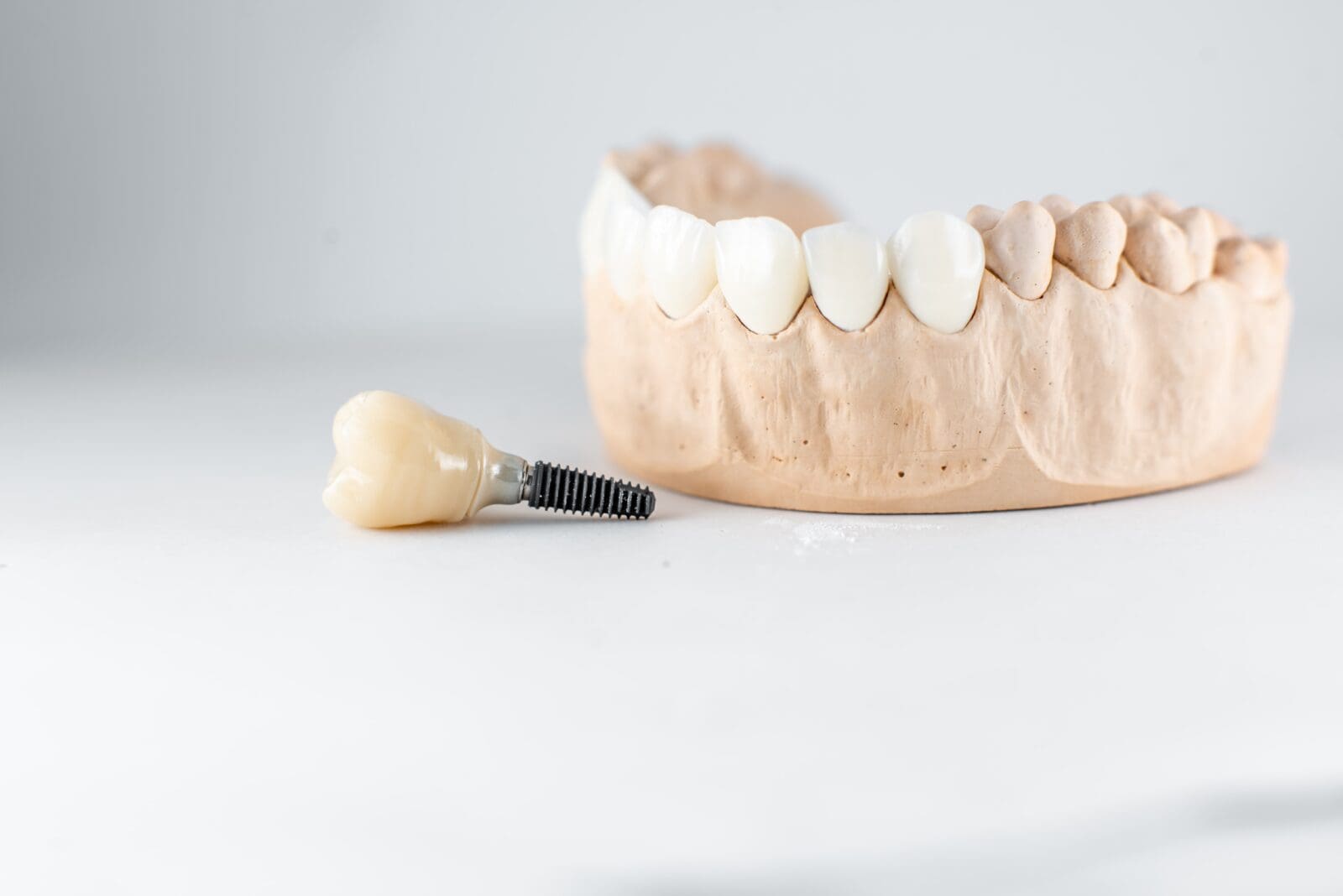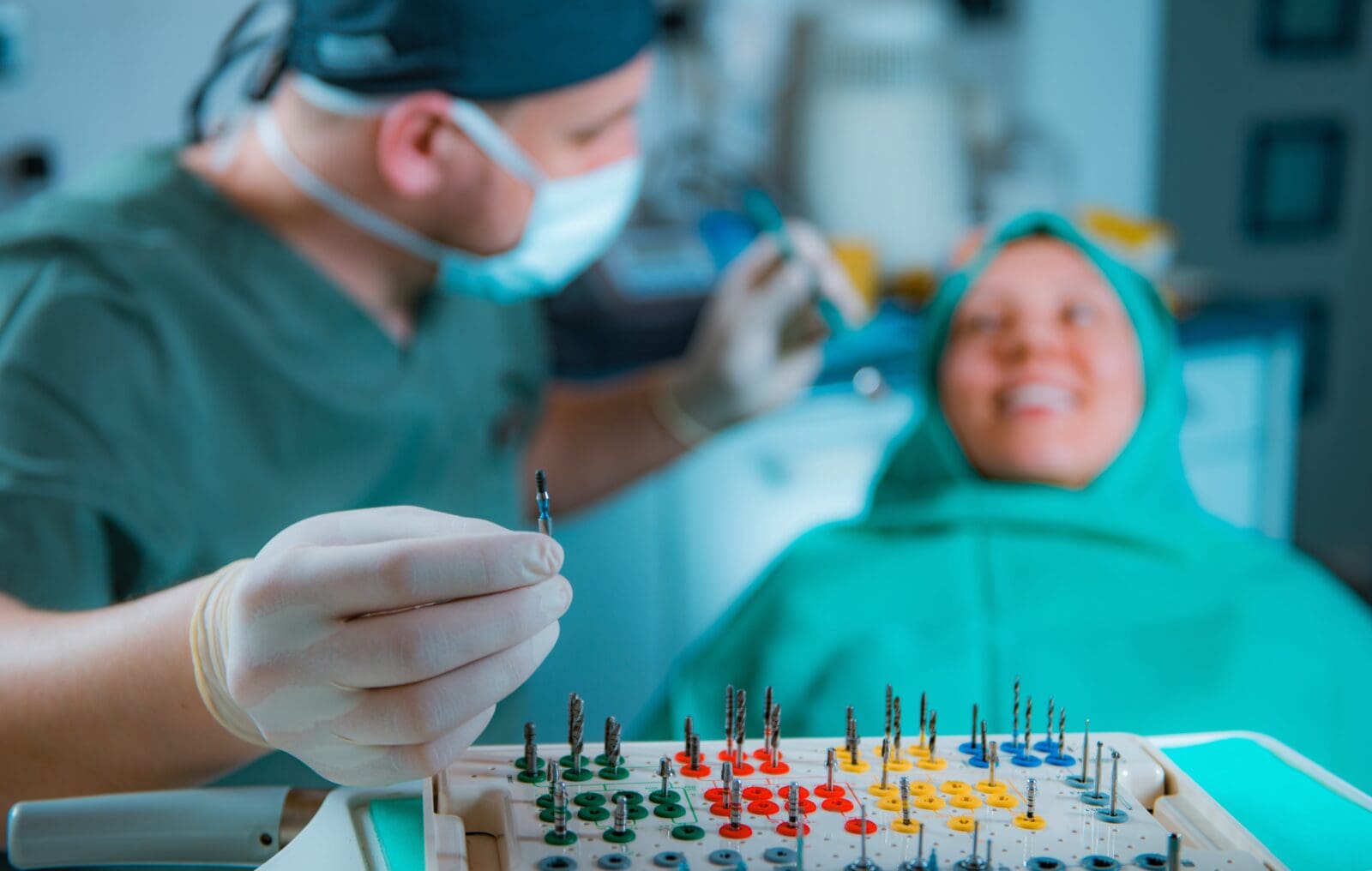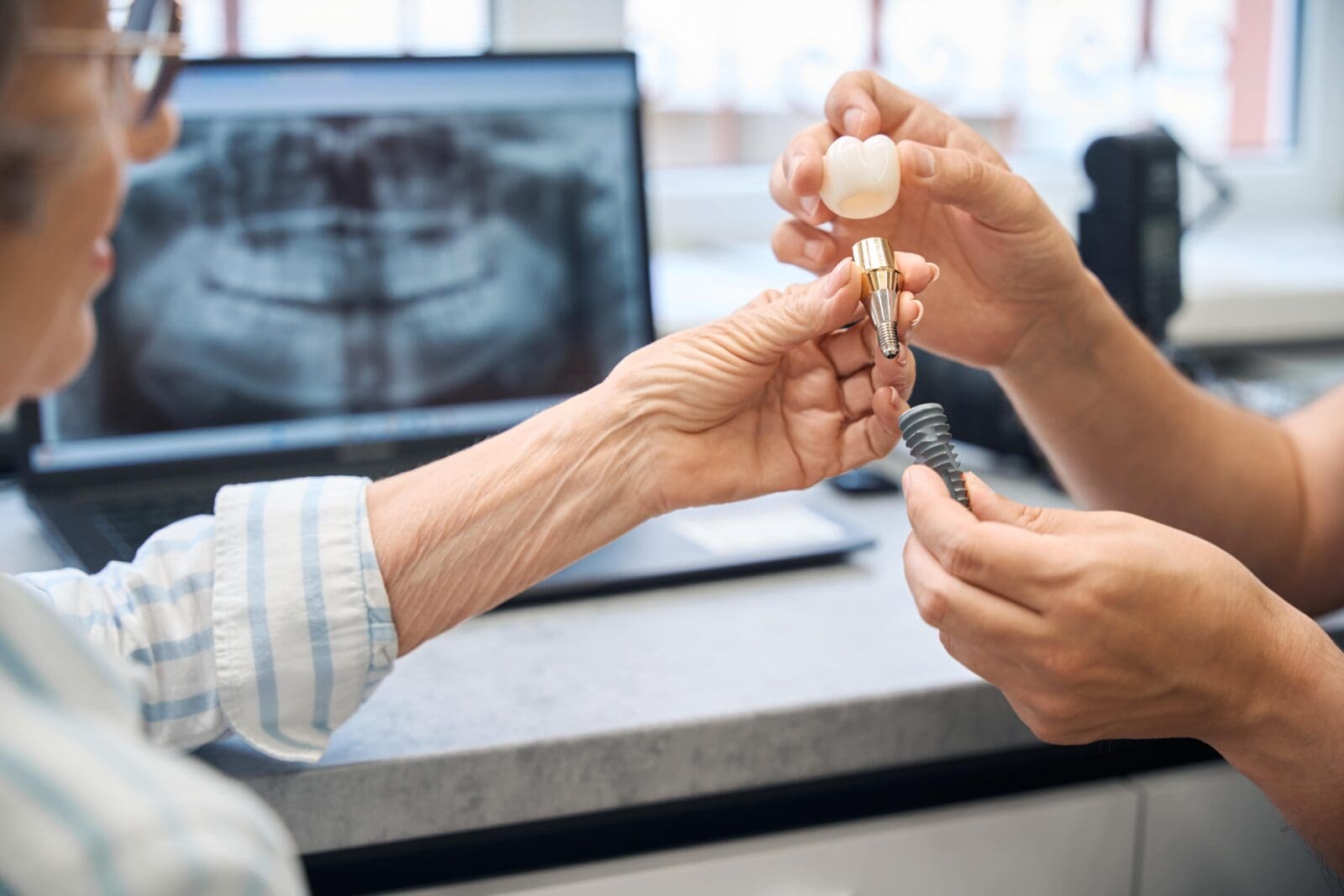At-a-Glance: Why Choose Dental Implants?
- Permanent replacement for one or more missing teeth
- Look, feel, and function like your natural teeth
- Help prevent jawbone loss and changes in facial shape
- Versatile enough to support single teeth, bridges, or full-arch restorations
- Backed by advanced surgical technology and customized sedation options for your comfort
What Are Dental Implants and How Do They Work?
A dental implant is a small post made of titanium that’s placed in your jaw where a tooth is missing. It acts like the root of a natural tooth.
Over time, the implant bonds with your bone. This creates a strong foundation for a crown, bridge, or even a full-arch of teeth. The process is called osseointegration, and it’s what makes implants so stable.
Unlike removable dentures, implants stay in place and feel like real teeth. They let you eat, speak, and smile with confidence.
Recommended reading: What Are Dental Implants?
Who Is a Good Candidate for Dental Implants?

Have one or more missing teeth.
If you’re missing even one tooth, a dental implant may be the best way to replace it. Gaps can cause your other teeth to shift over time, affecting your bite and your ability to chew comfortably.
Dental implants are a permanent solution that helps restore your smile and prevent future dental problems. Whether you lost a tooth due to decay, injury, or gum disease, replacing it early can protect your long-term oral health.
Are in good overall health
Good general health plays a key role in successful healing after implant surgery. If you’re able to undergo routine dental procedures like extractions or minor oral surgery, you’re likely a strong candidate.
Chronic conditions like uncontrolled diabetes, active cancer treatment, or immune disorders may affect healing, but they don’t always rule out implants. We’ll review your medical history carefully to make sure the procedure is safe and effective for you.
Being in good health ensures your body can support the implant as it bonds with your bone and gum tissue.
Have sufficient jawbone or are eligible for bone grafting
Dental implants require solid bone to remain securely anchored. If you’ve had missing teeth for a while, there’s a chance your jawbone has started to shrink in that area. This is common, but it doesn’t automatically disqualify you from treatment.
We use 3D imaging to check the density and volume of your bone. If it’s not thick enough, we can often rebuild it with a simple bone grafting procedure. This creates a strong foundation so your implant can be placed securely and heal properly.
Many patients who were once told they didn’t have enough bone now qualify thanks to these advanced techniques.
Don’t smoke or are willing to quit for healing
Smoking can slow healing and increase the risk of implant failure. That’s because it reduces blood flow to your gums and bone, both of which are essential for your implant to integrate successfully.
If you’re a smoker, that doesn’t mean you can’t get implants. But you’ll need to stop before and after the procedure to give your body the best chance to heal. Even cutting back significantly during the healing phase can improve your outcome.
We’re happy to discuss your options and offer guidance if quitting is part of your treatment plan.
Even if you’ve been told in the past that you don’t qualify for implants, there may still be options. Advanced techniques like bone grafting and zygomatic implants have helped many patients with bone loss get the care they need.
Still not sure if you’re a candidate? Visit our Dental Implant FAQs for more details on who qualifies and what to expect.
What to Expect During the Dental Implant Process in Frederick, MD

1. Consultation and digital planning
Every implant journey starts with a thorough consultation. We’ll take the time to understand your goals, medical history, and concerns. Then, we conduct a comprehensive oral examination and take 3D digital scans of your jaw.
These images help us plan your treatment with pinpoint accuracy. Using advanced software, we can map the ideal implant position and avoid critical structures like nerves and sinuses. If you need additional procedures like extractions or grafting, we’ll build that into your plan from the start.
2. Tooth extraction (if needed)
If you still have a damaged or unsalvageable tooth in the area, we’ll gently remove it before placing your implant. In many cases, this can be done during the same visit as your consultation or implant placement.
Extractions are typically quick and comfortable, especially with local anesthesia and sedation options to help you relax. Once the tooth is removed, we assess the bone and gum tissue to decide whether the implant can be placed right away or if healing time is needed.
Taking this step early helps prepare your mouth for the most stable, natural-looking restoration.
3. Bone grafting (when required)
If your jawbone isn’t thick or dense enough to support an implant, we may recommend a bone graft. This is a straightforward procedure in which we add bone material to rebuild the area and create a stable base for the implant.
Bone grafting doesn’t always mean a long delay. In some cases, we can place the implant at the same time. At other times, we allow a few months for the graft to fully integrate before proceeding.
The goal is to give your implant the strength and support it needs to last for years to come.
4. Surgical placement of the implant
Once your jaw is ready, we place the dental implant directly into the bone beneath your gum. The procedure is always performed under sedation, with patients having the option to choose between oral sedation or IV sedation for their comfort.
The process typically takes less than an hour per implant. We use precise digital planning to guide placement and ensure optimal positioning. After the implant is placed, the gum is gently closed around it, and a healing cap is applied.
Most patients experience minimal discomfort afterward, often less than a tooth extraction, and resume normal activities within a day or two.
5. Healing and integration period
After the implant is placed, your body begins the process of fusing the titanium post with your jawbone. This is called osseointegration, and it’s what makes dental implants so stable and long-lasting.
Healing typically takes a few months, usually around 3 to 6, depending on your bone health and whether a graft was performed. During this time, you may wear a temporary restoration so you’re never without a tooth.
We’ll schedule check-ins along the way to monitor your progress and make sure everything is healing exactly as it should.
6. Final restoration with a crown or bridge
Once your implant is fully healed and securely integrated, you will be referred back to your general dentist for the final restoration, typically a crown for a single tooth or a bridge for replacing several teeth in a row.
The restoration is custom-made to match the shape, size, and color of your natural teeth. It’s designed for long-term durability and a seamless look so that no one can tell the difference.
At this stage, your smile is fully restored. You’ll be able to chew, speak, and smile just like you would with natural teeth.
Want to see how it all comes together? Learn more about guided implant surgery and how it helps us plan every step with precision.
Are Dental Implants Painful?
No, most patients find the dental implant procedure surprisingly comfortable. It’s performed with local anesthesia to numb the area, so you won’t feel pain during placement.
For added relaxation, sedation options are available to help ease any anxiety. After the procedure, some mild soreness or swelling is normal but typically lasts just a few days.
In fact, many patients say the recovery feels easier than having a tooth pulled.
How Long Do Dental Implants Last?

Dental implants are built to last. With good care, they can stay in place for 20 years or longer, and in many cases, they last a lifetime.
Here’s what to expect:
- The implant post (inside the bone) is made of durable titanium and rarely needs replacement.
- The crown or bridge on top may need to be replaced after 10 to 15 years due to normal wear and tear.
Regular brushing, flossing, and dental checkups help keep your implant healthy and secure for the long run.
Benefits of Choosing Dental Implants in Frederick, MD
Permanent solution (no slipping or adhesives)
Unlike dentures, dental implants stay firmly in place. They’re anchored into your jawbone, which means there’s no need for messy adhesives or worrying about movement when you talk or eat.
You can bite into foods with confidence and speak naturally, without the fear of slipping or discomfort. It’s a long-term fix that feels like your real teeth.
Helps maintain jawbone and prevent facial collapse
When you lose a tooth, the jawbone beneath it begins to shrink over time. That’s because there’s no longer a root to stimulate the bone during chewing.
Dental implants act like artificial roots. They send signals to the bone, helping it stay strong and healthy. This prevents bone loss and the sunken facial appearance that often comes with missing teeth or long-term denture use.
Preserving your bone also protects the shape of your jaw and overall facial structure.
Restores full chewing strength and speech clarity
Dental implants restore nearly all the biting power of natural teeth. That means you can enjoy your favorite foods again (whether it’s crunchy vegetables, steak, or apples) without discomfort or worry.
They also help improve speech. Unlike dentures that can shift or click, implants stay securely in place, allowing you to speak clearly and confidently.
You don’t have to think about your teeth; they just work like they should.
Protects neighboring teeth
Dental implants replace missing teeth without relying on adjacent teeth for support.
Unlike traditional bridges, which require grinding down healthy teeth on either side, implants stand on their own. This helps preserve your natural tooth structure and keeps the rest of your smile stable.
It’s a healthier, more conservative approach to tooth replacement that focuses on long-term function and preservation.
Improves confidence and long-term quality of life
Missing teeth can affect more than just your bite. They can affect how you smile, speak, and interact with others.
Dental implants look and feel like real teeth, which means you can smile freely, laugh without hesitation, and enjoy social moments without holding back. They’re stable, natural-looking, and easy to care for, making everyday life more comfortable and enjoyable.
Dental Implants vs. Other Tooth Replacement Options in Frederick, MD
Dental implants offer unique advantages that other options simply can’t match. Unlike dentures or bridges, implants become part of your jaw. They don’t shift, they don’t rely on other teeth for support, and they don’t come out at night.
Here’s how they compare:
- Dentures sit on the gums and can slip during eating or speaking. Implants stay fixed in place.
- Bridges require grinding down nearby teeth for support. Implants leave healthy teeth untouched.
- Only implants stimulate the jawbone, helping preserve bone density and facial shape.
But depending on your needs, there are other implant-based solutions to consider, each with its own benefits.
Implant-Supported Dentures
Implant-supported dentures snap onto two or more dental implants, providing far more stability than traditional removable dentures. They’re ideal for patients who want better chewing power without a full set of fixed teeth.
You still remove them for cleaning, but they won’t slip or move during the day.
All-on-X Full Arch Implants
All-on-X is a fixed, full-arch solution for patients missing all their teeth on the upper or lower jaw. It uses as few as four strategically placed implants to support an entire set of teeth, often with teeth in one day.
It’s a permanent, non-removable option that looks and functions like your natural smile.
Zygomatic Implants for Severe Bone Loss
If you’ve been told you don’t have enough upper jawbone for implants, zygomatic implants may be the answer. These longer implants anchor into the cheekbone (zygoma) instead of the jaw, bypassing the need for grafting.
They enable secure, long-term tooth replacement, even in complex cases.
Why Choose Dr. Melanie Towe in Frederick, MD?
When it comes to dental implants, experience matters.
Dr. Melanie Towe is a board-certified periodontist with advanced training in implant surgery, bone regeneration, and soft tissue aesthetics. She specializes in both simple and complex cases, including patients who’ve been told they aren’t candidates elsewhere.
At our Frederick office, you’ll benefit from:
- Precision planning using advanced digital imaging
- A team that prioritizes comfort, communication, and results
- One location for everything, from consultation to final restoration
You’re not just getting an implant. You’re getting a custom, long-lasting solution from a trusted local expert.
Key Takeaways
- Dental implants are the most advanced and reliable solution for replacing missing teeth
- They’re designed to look, feel, and function just like your natural teeth
- Treatment is safe, precise, and comfortable, even for more complex cases
- Most healthy adults qualify, even those with bone loss or previous dental challenges
- With consistent care, implants can last a lifetime, protecting both your smile and your confidence
FAQs about Dental Implants
What are dental implants?
Dental implants are small titanium posts placed in the jaw to replace the roots of missing teeth. They support crowns, bridges, or dentures and function like natural teeth, restoring your ability to chew, speak, and smile confidently.
Are dental implants painful?
Most patients report little to no discomfort during the procedure. It’s done under local anesthesia, and we offer sedation for added comfort. Recovery is typically mild, often easier than a tooth extraction.
How long do dental implants last?
With proper care, implants can last 20 years or more. The titanium post can last a lifetime, while the crown or bridge may need replacement after 10 to 15 years due to normal wear.
What if I’ve lost bone in my jaw?
You may still be a candidate. Bone grafting can rebuild support for implants, and advanced options like zygomatic implants bypass the jawbone entirely. We’ll evaluate your needs during your consultation.
Are dental implants better than dentures?
Yes, in most cases. Implants are fixed in place, prevent bone loss, and feel more like natural teeth. Dentures can shift, affect speech, and may require adhesives. Implants offer greater stability and long-term value.
Who is a good candidate for dental implants?
Most healthy adults qualify. You’ll need healthy gums, enough bone (or be eligible for grafting), and the ability to heal well. Age isn’t usually a barrier, and even complex cases can often be treated.
Book Your Dental Implant Consultation
Ready to take the next step toward a stronger, more confident smile?
Whether you’re missing one tooth or several, dental implants can restore what you’ve lost and protect your oral health for years to come.
Call us at 240-363-0360 or book your consultation online to find out if you’re a candidate.
Let’s build a solution that fits you.
